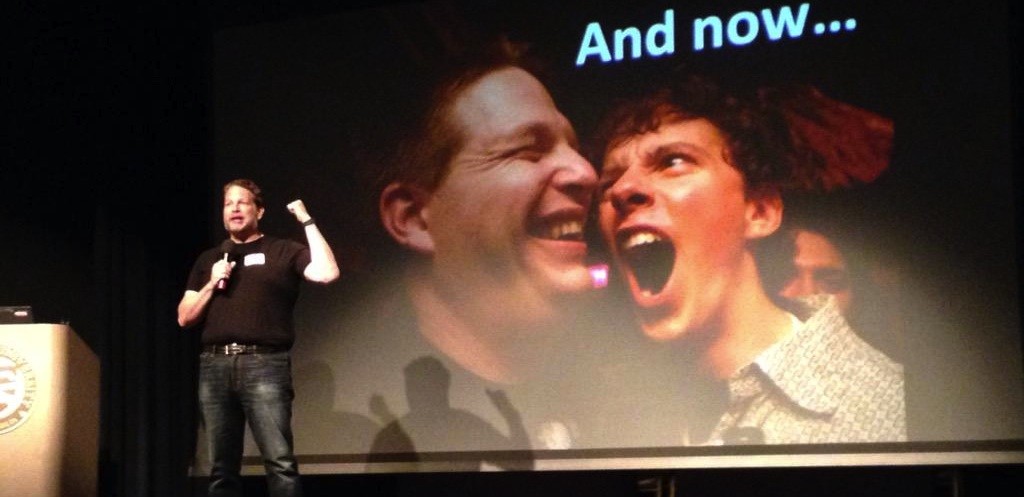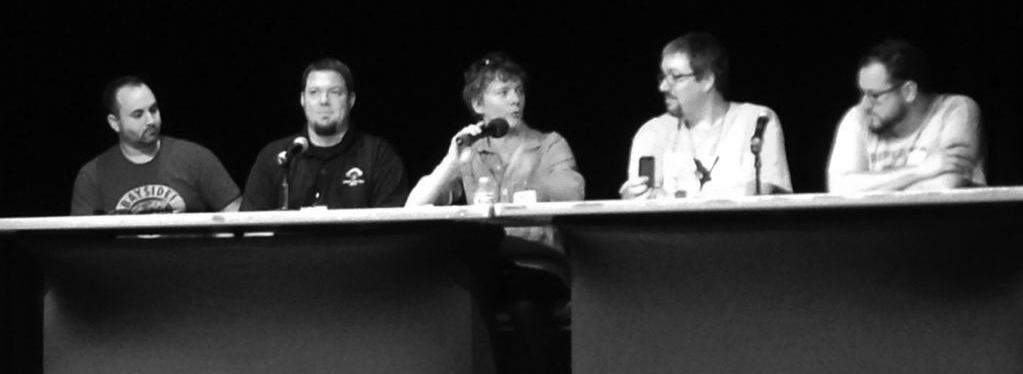For a keynote I finished making at 4 AM, this one went quite well.
A couple months ago, when PodCamp Pittsburgh 10 (or PCPGHX) was announced, the organizers asked me if I’d be able to attend. I helped co-found the event back in 2006, but now that I live in Baltimore, I hadn’t been back in a few years. I told them I’d be happy to come back for its 10th go-round.
Then they asked me if I’d like to do the keynote. I said sure.
And then I waited until two days before the event to figure out what that keynote would be.
I wanted to make sure I gave the attendees something interesting, useful, inclusive, and — ideally — inspiring. But most of my observations about the past decade of digital media are a little dystopian, so I had to find the upside.
Then we found out Chris Brogan, who co-founded the original PodCamp with Christopher Penn, was able to join us for PCPGHX. Great!! I asked if he’d like to co-keynote with me. He said sure. Even better.
But now I also had to bring my keynote back around to a closing that doubled as Chris’s opening. Hmm…. tricky. And yet, it gave me exactly the anchor I needed.
I wasn’t supposed to be up past 3 AM the night before speaking. But the more I thought about what I wanted to say, the more my narrative kept changing. As I caught a nap before sunrise, I thought of still more changes I wanted to make to the deck (and I did). But all that tinkering paid off.
Ideas evolve.
People evolve.
Events evolve.
I co-founded PCPGH in 2006, after being inspired by original PodCamp in Boston. Brogan and Penn did theirs in September 2006; we did ours in November 2006. A lot has changed in the world of digital media since then, which I mention in my keynote above. And some things are still wonderfully (or frustratingly) the same.
After enjoying myself this weekend, I reflected on the event as I drove back to Baltimore. Here’s what I thought, what I learned, what I wonder, and what I think will happen next.
Someone Is Always at an Entry Level
For those of us who’ve been creating digital media for years, it can be surprising to hear people still ask questions like “what kind of microphone should I use?”
On the other hand, it’s awesome that people still ask that same question.
Why?
Because that means new people still want to learn what the rest of us take for granted. If you’ve been making media (or doing anything) for years, your perception is skewed. You may presume that everyone else already knows what you know, simply because you live and work in that topic every day.
But you’re wrong.
The truth is, almost no one knows anything about anything.
The guy next to you knows a lot less than you (or he) think he does about pretty much every topic ever touched upon — and even if he does know something, he’s still not sure about it. So when he hears his beliefs or hunches validated by someone else, it gives him the confidence to keep trying because he feels like one more step on the staircase of eventual success was just spotlighted.
You shouldn’t be worried that people are still asking how to get started.
You should worry when they stop being interested enough to ask.
No One Ever Has Any Idea What You’re Doing
Social media is an optical illusion.
You share something on Facebook and you presume everyone you know has seen it (even though you know that’s impossible). But because you’ve said it or shared it once, you’re reluctant to mention it again because you don’t want to look like an overpromoter.
And then you have a conversation with someone you interact with often online, and s/he starts asking you questions that s/he wouldn’t be asking if s/he’d seen your recent status updates, or tweets, or Instagram photos… and you realize that what you think everyone else already knows is still breaking news to the vast majority of the people you know, regardless of how often it seems like you interact.
(This also reinforces the fact that everyone perceives you slightly differently.)
I don’t mean to suggest you should be relentlessly self-promotional online, or that you should endlessly repeat the same messages because you’re desperate that everyone sees them.
Just don’t expect everyone to be up to speed. Old news is always brand new to someone.
Case in point: this was the 10th annual PodCamp Pittsburgh, yet some people said they’d never heard of it before. There is always someone out there that you haven’t connected with, so keep reaching. (Just make sure you’re offering something worth being received.)
There’s No “Welcome Back” Without “Welcome.”
After ten years of the same event in the same community, there are two pretty distinct groups of PCPGH attendees: the veterans and the newbies. (By now, there are even subgroups within the veterans. Our community keeps expanding like a Russian nesting doll.)
But newbies won’t become veterans if they don’t come back.
The challenge at any event that also doubles as a social gathering is that there’s only so much time to talk to people. Those of us who’ve been to these events for years look forward to them as a reunion of sorts, which means our social needs are different from those of first-timers.
The problem is, our desire to catch up with the people we know can keep us from meeting the people we don’t. And if new people don’t make new connections that last, they may not feel like they’re welcome to become active members in the community. Without a constant infusion of new blood, any community will eventually wither.
There were a lot of new attendees at PCPGHX, which was great. But I know that I personally didn’t speak to many of the new people, and this was my main regret as I was driving home. I didn’t do it because I was consciously avoiding them, but because I have so many old friends I hadn’t seen in years, I was choosing to reconnect more than I was choosing to connect anew.
I hope the new attendees learned something they’ll find useful. But more importantly, I hope they met kind and interesting people whose interactions will inspire them not only to take risks and make new things, but to come back again and continue to be a part of the community, so they can help direct its future.
That’s because…
Digital Media Is Already Becoming Generational
Those of us who founded the PodCamp concepts were mostly in our 20s and early 30s at that time. Now we’re mostly in our 30s and early 40s, and above. Many of the folks who were single or childless when social media went mainstream are now married with children.
This means we have less time to explore new media. It also means we have our pre-conditioned habits and preferences. And it means we may have ideas of ourselves as “experts” that might make us resistant to new technologies and new POVs. (This is ironic, since social media boomed because we were the young disruptive punks not so long ago.)
This also means digital parenting is now a concern. I don’t have kids yet, but the horror stories I hear of parents monitoring their children’s online presence makes me realize none of us was born with digital parenting as a natural skill. Our digital native kids won’t feel that way when they’re parents, but for those of us figuring out how this works now, this is the kind of pioneering that should come with Xanax.
What’s the Future of Social Media?
Even asking this question feels somehow archaic.
On one hand, social media is now so chronically embedded in our daily lives that it’s hard to remember there was a time when “Web 2.0” was something we had to convince people to take seriously.
On the other hand, the more normalized and commoditized something becomes, the more its ability to be disruptive and transformative decreases.
PodCamps were launched in an era when making digital media was so new, those creators had trouble finding peers to learn from. Now, everyone is a digital media creator — all day, every day. Along the way, “media” became “content,” and “social” became “personal brand-oriented.”
Most of the old school social media pros have gone on to make a living in social marketing instead. Chris Brogan, who helped get this whole digital ball rolling a decade ago, is openly wondering how to articulate the value of the peer education “unconference” events like PodCamp in an era when some people pay $1000 to learn from pros at major tech conferences instead.
It’s a valid question, and I think Chris is asking it because he realizes there’s still a need for grassroots events even within our slick, high-value corporate event marketplace. He’s just not sure how to make those events worth everyone’s time — organizers, sponsors, and attendees alike.
In other words: what’s the ROI of people in a room?
Here’s what I think:
The future of community events will be determined by the communities they attract.
Not everyone can afford to pay to learn from the pros. Nor do they want to learn from free video tutorials online. They want to learn in person from “people just like them,” give or take. And that means there will always be a place for live idea exchange.
In fact, I think that’s the real value of any event. Ideas have a way of manifesting themselves during conversations and juxtapositions of personalities and points of view that get smashed together in unexpected ways.
You don’t quite get the same thing from staring at a screen.
Nor does a screen let you tangibly exchange wisdom and emotion in real time.
To be honest, sitting on a panel this weekend talking about the past and future of podcasting felt almost quaint. It’s been nine years since all this started. Haven’t all the stories been told already?
And yet, the people in that audience came to listen and learn, because they want to know what we know. They have needs and hopes and desires, and they want to learn how to express themselves in a meaningful way. They want to create and connect.
And that never gets old.
Photo of Justin Kownacki by Douglas Derda • Photos of Chris Brogan and the PCPGH podcasting panel by Carla Swank.




2 Comments
Lessons from a Year of Freelancing | Justin Kownacki · November 2, 2015 at 12:12 pm
[…] when I’m blogging or speaking, I enjoy the performative aspect — but I also strive to deliver insights that help people […]
You Can’t Achieve Your Goals Until You Do This | Justin Kownacki · August 25, 2015 at 7:13 pm
[…] I’m a good public speaker, especially about the intersection of media, marketing, sociology, and humanity. I love getting in front of an audience and educating them while entertaining them. (Here’s my most recent keynote speech.) […]